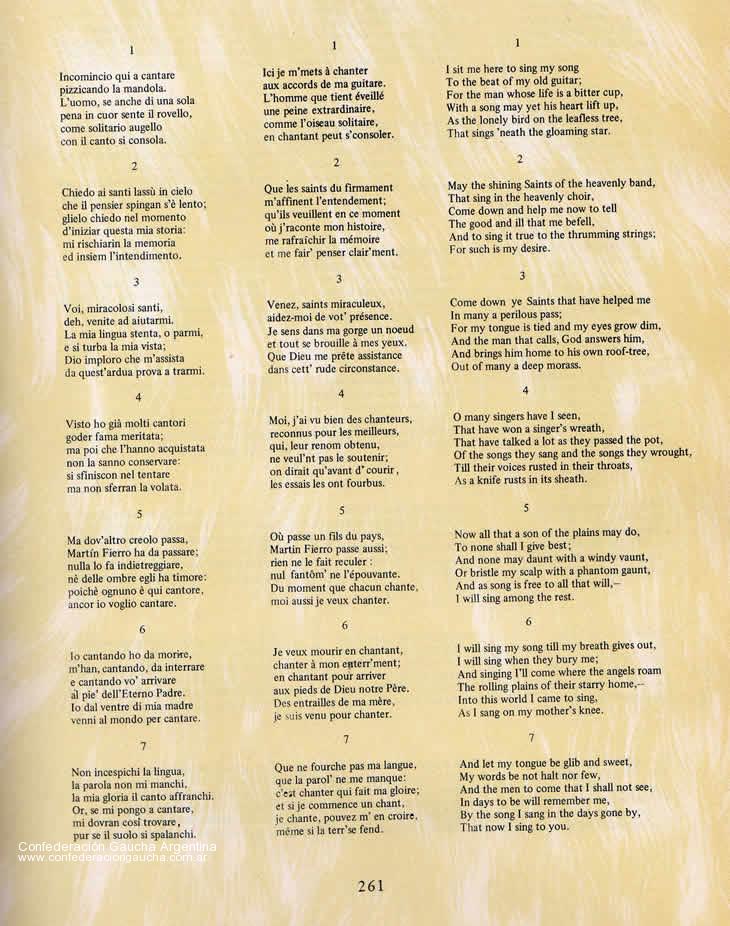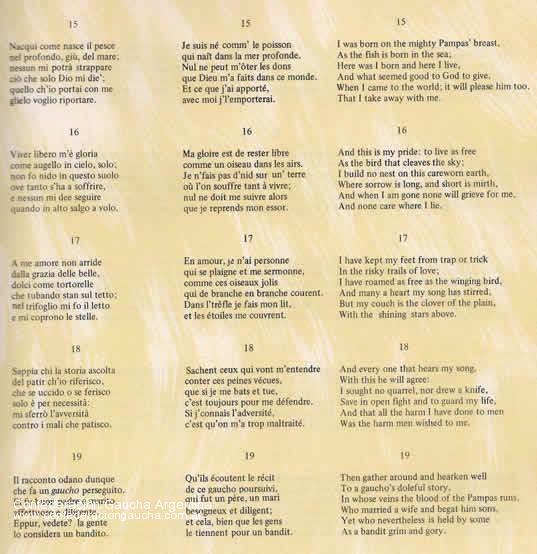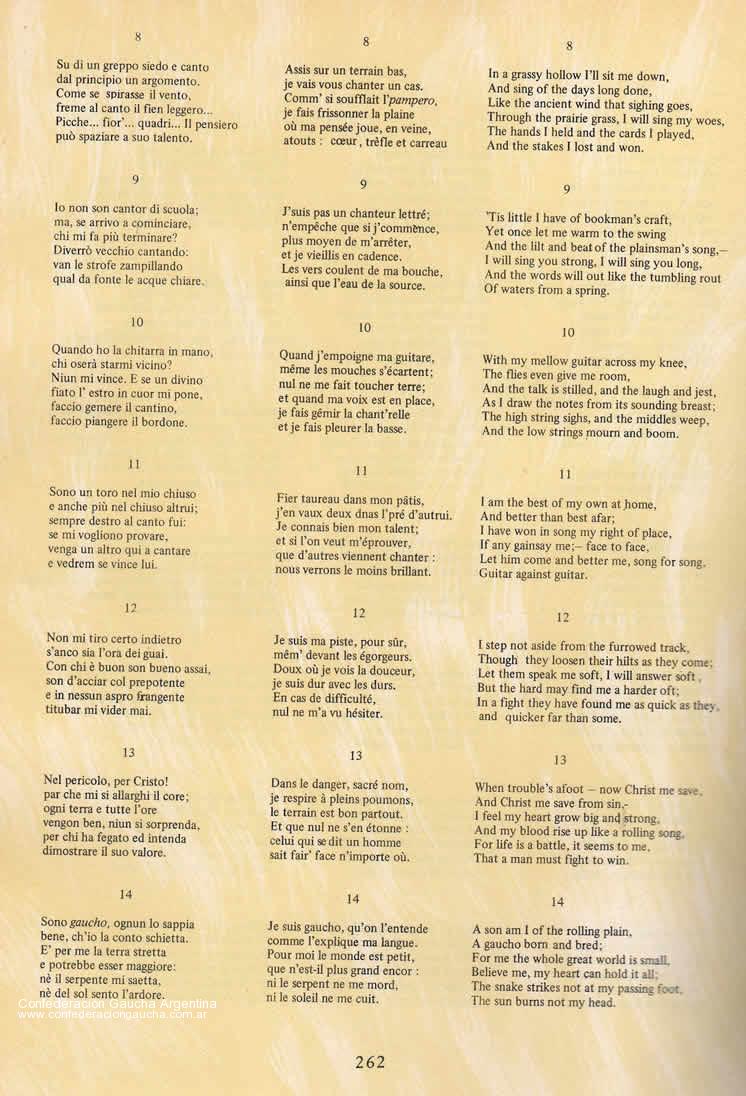Traducir el Martín Fierro. Una tarea nada fácil
La dificultad de traducir el Martin Fierro radica enque esta escrito en un lenguaje unico, especifico de una zona geografica, factores historicos propios, con influencias religiosas y tradicioanles que no seran abarcadas de forma apropiada incluso cuando se intente comparar con situaciones similares de otros paises o lugares.
The difficulties of translating Martin Fierro must be obvious. As it is written in a language unique to its geographical and historical circumstances, no dialect of another language could be entirely appropriate: even with a similar background (as with North American cowboys, for instance); the inherited traditions, religion, etc., would alter the type of images used.
In this translation [originally with a bilingual edition in mind] the aims have been, in this order: (a) to follow the text as closely as possible, especially in the imagery; (b) to make the translation read fluently in current but neutral (i.e. non‑dialect and international) English; (c) to keep a rhythm in the translation giving an idea of the shape and movement of the phrasing in the original. The poem is written almost entirely in six‑line rhymed stanzas, with almost invariably a strong pause at the end of every second, fourth, and sixth line, so that the lines fall into pairs. In this translation those six lines are printed as three long divided lines: with very few exceptions each long line in English corresponds to two short lines in the Spanish, though for the sake of fluency the order of phrases may be rearranged. This should help readers whose Spanish is limited or who are unfamiliar with River Plate idioms, towards reading the original. For this reason too, closeness to the text was given priority over trying to find rhyme or strict rhythm in English (an English translation with these priorities reversed already exists in Walter Owen's of 1933, which renders the poem's colloquial element often very successfully, though arguably not its dignity).
The translation follows the original punctuation with the dashes which Hernandez used freely to mark pauses ‑- particularly before the last two lines of a stanza where a proverb often comes as a punch‑line. Images have been translated directly wherever possible, though sometimes amplified to make the point of comparison clearer.
Where there is any considerible departure from the original, the literal translation is given in a note. Exceptions are cases where there is a saying in English with nearly precise equivalent meaning (e.g. "by the skin of my teeth" for con el hilo en una pata). Untranslateable jokes (e.g. at 1/5/11) are explained in notes attempting to show the type of humour in the original even if there is no equivalent. In general words in Spanish have been avoided except when they have no translation (such as poncho and mate), or have an important specific meaning (criollo), with the names of some animals.
Frequently used general terms (gaucho, indian, pampa, christian) have not been given capital letters. Capitals have been used for abstract concepts (Law, Government) or words alien to gaucho life that the narrator may be emphasising, sometmes ironically. "Negro" (probably less offensive in Spanish) has been replaced by "black" or the humourous "darky", except for the protagonist of the singing contest at II.30 which has been left as in the original.
An earlier version of this translation, edited by the State University of New York, Albany, NY, was published in 1967, courtesy of the Pan-American Union in Washington, with illustrations by Antonio Berni. It has also been used for an edition in English accompanied by works by Argentine painters, published by the Zurbaran Gallery,
Buenos Aires, in 1996.
MARTIN FIERRO, THE GAUCHO *
1
Here I come to sing to the beat of my guitar:
because a man who is kept from sleep by an uncommon sorrow
comforts himself with singing, like a solitary bird.
I beg the saints in heaven to help my thoughts:
I beg them here and now as I start to sing my story
that they refresh my memory and make my understanding clear.
Come, saints with your miracles, come all of you to my aid,
because my tongue is twisting and my sight growing dim—
I beg my God to help me at this hard time.
I have seen many singers whose fame was well won,
and after they've achieved it they can't keep it up --
it's as if they'd tired in the trial runs* without ever starting the race.
But where another criollo* goes Martin Fierro will go too:
there's nothing sets him back, even ghosts don't scare him --
and since everybody sings I want to sing also.
Singing I'll die, singing they'll bury me,
and singing I'll arrive at the Eternal Father's feet –
out of my mother's womb I came into this world to sing.
Let me not he tongue-tied nor words fail me:
singing carves my fame, and once I set myself to sing
they'll find me singing, even though the earth should open up.
I'll sit down in a hollow to sing a story --
I make the grass-blades shiver as if it was a wind that blew:
my thoughts go playing there with all the cards in the pack.*
I'm no educated singer, but if I start to sing
there's nothing to make me stop and I'll grow old singing --
the verses go spouting from me like water from a spring.
With the guitar in my hand even flies don't come near me:
no one sets his foot on me, and when I sing full from my heart
I make the top string moan and the low string cry.
I'm the bull in my own herd and a braver bull in the next one;
I always thought I was pretty good, and if anyone else wants to try me
let them come out and sing and we'll see who comes off worst.
I don't move off the track even though they're out cutting throats:*
with the soft, I am soft, and I am hard with the hard,
and in a time of peril, no one has seen me hesitate.
In danger -- by Christ! my heart swells wide:
since the whole earth's a battlefield and no one need be surprised at that,
anyone who holds himself a man stands his ground, no matter where.
I am a gaucho, and take this from me as my tongue explains it to you:
for me the earth is a small place and could be bigger yet --
the snake does not bite me nor the sun burn my brow.
I was born as a fish is born at the bottom of the sea;
no one can take from me what I was given by God --
what I brought into the world I shall take from the world with me.
It is my glory to live as free as a bird in the sky:
I make no nest on this ground where there's so much to be suffered,
and no one follows me when I take to flight again.
In love I have no one to come to me with quarrels:
like those beautiful birds that go hopping from branch to branch
I make my bed in the clover and the stars cover me.
And whoever may be listening to the tale of my sorrows –
know that I never fight nor kill except when it has to be done,
and that only injustice threw me into so much adversity.
And listen to the story told by a gaucho who's hunted by the law;
who's been a father and husband hard-working and willing --
and in spite of that, people take him to be a criminal.
Español, Ingles, Frances e Italiano


